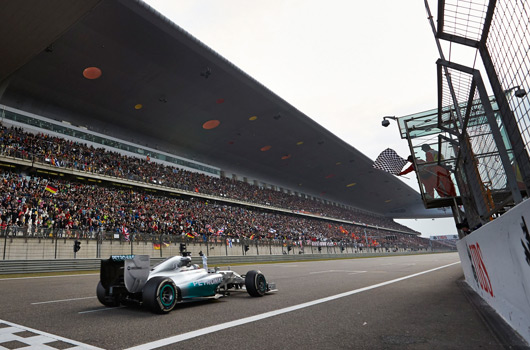While Formula 1 continues to find its way in the new V6 power unit era we’ve heard a lot of moaning about how slow the cars are compared with the normally aspirated and relatively thirsty engines of recent years. Perhaps over a single lap that may be the case, but what about over a full race distance?
The table below compares the total time elapsed for the first four races of 2013 against the same events from 2014. Due to differences in tyre degredation and other possible variables we do acknowledge this is not a foolproof measure to establish the outright speed of the new fuel efficient regime.
We also have to stress that the Chinese Grand Prix was supposed to run for 56 laps, which it did in theory. So the total elapsed time for the full 56 laps is shown below, rather than the 54 lap result which came about due to the chequered flag first being waved on lap 55.
| Location | 2013 | 2014 | Difference |
|---|---|---|---|
| Australia | 1:30:03.225 | 1:32:58.710 | +0:2:25.485 |
| Malaysia | 1:38:56.681 | 1:40:25.974 | +0:1:29.293 |
| Bahrain | 1:36:00.498 | 1:40:25.974 | +0:3:42.245 |
| China | 1:36:26.945 | 1:36:52.810* | +0:0:25.865 |
As you can see, the result in China shows it took Lewis Hamilton around 26 seconds longer to win in the race in 2014 compared with Fernando Alonso’s race winning time from 2013. That’s less than 0.5 seconds per lap slower while using around 33% less fuel. A small price to pay, don’t you agree?
If you compare Lewis’ 2013 result in China—he finished third, 12.3 seconds behind Alonso—the gap to his 2014 result is even closer—around 14 seconds—just 0.25 seconds per lap across the full race distance.
This stat has been highlighted by Joe Saward, who argues the FIA has not been proactive enough to promote this early success of the new world era:
Now that is what I call getting a better bang for your buck. And I’m willing to bet that by the end of the year the gap will have closed more and, perhaps, the races will be run even faster than they were 12 months ago.
So who has highlighted these statistics? Who has told the world that F1 is doing a brilliant job for them? If no-one says this stuff how can the sport to sell the success of its new engine formula? That leaves the way open for the naysayers and the vested interests to promote their negative messages about the sport.
Saward makes a great point. Follow the link below to read his thoughts in full.
[Source: Joe Saward]
